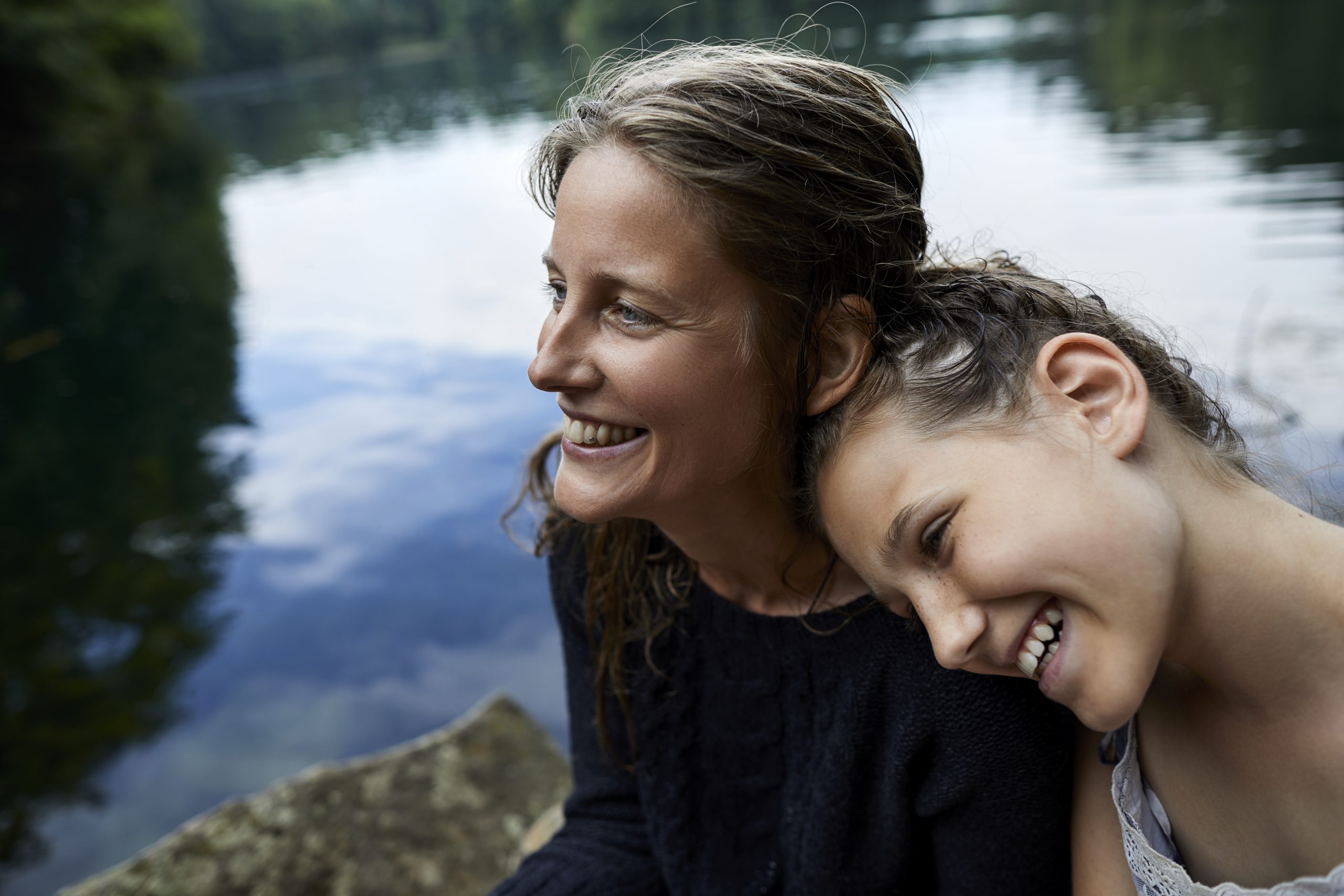
Kate and Rio Ferdinand have shone a new light on being a stepfamily, with the release of their new BBC One documentary, Rio and Kate: Becoming a Stepfamily.
Kate, a former TOWIE star, entered Rio's life back 2016, a year after the death of his wife, Rebecca Ellison.
Since then, Kate has quit her career to immerse herself in family life full-time, becoming a stepmum to Rebecca and Rio's three children, and moving in to the home they share together. The pair even tied the knot in October 2019.
But while things might have looked like they going swimmingly, behind-the-scenes it was a struggle adjusting to becoming a 'blended family'.

While the documentary aired last week, in an interview, Kate has confessed that she initially found it incredibly difficult stepping into the role of step-mum. She told YOU magazine, "I felt as though I was acting all the time, trying to smile and learn to cook and be this perfect woman.
"When I’d cook something, someone would say, 'Rebecca didn’t do it like that,' and I’d smile, but inside I’d feel crushed. I lost myself."
Becoming a stepfamily requires carving out new roles within the family, navigating new and complex relationships, and working out not to step on the toes of the parent who may be missing.
Parenting advice, hot topics, best buys and family finance tips delivered straight to your inbox.
So what are the main challenges of becoming a stepfamily - and how can you try and tackle them, together?
If you are a stepparent:
Don't try and force affection with stepchildren - instead, let it happen naturally
An important thing to remember is that a relationship between you and your stepchildren should never be forced, or under pressure. Relate, a relationship charity, notes that introducing a step-parent can be a huge upheaval for any children, so it's all about time.. They said, "They may need a little time and space before they’re ready to come to terms with their new circumstances, so try to provide this. Progression in situations like these is often gradual: you can’t necessarily expect it to happen overnight."

Family Lives, a family relationships charity, also noted how vital it is to spend time with your step-children, to build the relationship organically. "It is important to try and prioritise children where you can as unlike partners who are with you for life children grow up and leave," they explained. "You’re on a ticking clock but in a time that is vital for both of you. The few years you have full time with them set the standard for the whole of their life and set a flavour for the rest of yours.
Rachel Davies, a Relate counsellor, advised getting to know your stepchildren as friends, rather than trying to be a parent to start off with.
"Love and trust take time to develop so take an interest in them but be patient. Let the children lead in terms of when they are ready for a closer relationship. Ask what they are interested in and if you have some shared interests, see if they want to do them together. If they aren’t ready, avoid putting pressure on them. Most importantly be real and avoid over-doing things. Children are very perceptive and will know if you’re not being authentic.
"And importantly, allow them to have one-to-one time with the biological parent so that their relationship with them doesn’t feel threatened."
Introduce discipline gradually and let your partner lead it
Disciplining step-children can often be a fraught subject too. While it's natural to want to assert yourself within the family dynamic, Relate advises taking a step back from being too strict, at least at the beginning.
"As a general rule, try not to assert yourself too quickly. It’s not a good idea to try to take over parenting duties if you’re a step parent: this will likely cause tension. Instead, agree on a number of ground rules with your new partner when it comes to discipline and make sure you’re there to back them up if needed."

Understandably, this can be difficult if you are regularly left alone with your stepchildren, or find it hard not to strictly discipline bad behaviour - particularly in young kids. But rest assured that the respect will come, and in time, it will be easier to assert yourself when your stepchildren may be misbehaving.
Make sure to have your own discussions with your stepchildren
Creating a blended family can be loaded with emotion if - as in Kate and Rio's circumstance - the mother or father has passed away. If that's the case - and even if it isn't - it could be really helpful to speak to your stepchild (or stepchildren) on your own about the new set-up too.
Rachel Davies explained, "Depending on the situation and age of the children it might be a good idea to sit down with them and explain that you’re not trying to replace their mum or dad. This can be especially important if their parent has passed away.
"It’s good to say that you really want to be able to get to know them and them to get to know you but that you understand that it may not be easy or happen straight away. And let the child know its ok to ask questions about you and that you will try to answer them honestly - this is more balanced and less intense than it all being about getting to know the child."
MORE: Kate Ferdinand admits she ‘cried every day for a year’ as she struggled to adjust to life as a stepmum
After all, hearing it from you, and so knowing that you mean it, is always preferable.
Jeremy Todd, Chief Executive from Family Lives, explained that talking about their child's lost loved one can also be comforting to them. He said, "Speak to the child about the things they loved about their deceased parent, and at an appropriate time, if there was a routine or activity that they mentioned ask if they would like you to participate/facilitate it."
If you are introducing a step-parent into your family
Firstly, make sure that you and your partner are really ready to involve the family in your relationship.
Relate counsellor Rachel Davies said, "It’s often a good idea to avoid introducing your new partner to your children until you’re pretty sure the relationship is going to be long-term. If the children get to know and like your new partner only for them to leave, this is likely to be really hard for them to deal with emotionally."
Rachel also advised making sure the meeting happens on neutral ground, so the kids feel safe and supported. "When you do introduce your new partner, do it on neutral territory and for a relatively short time frame to begin with," she said. "Doing some kind of activity together which is age appropriate can be a good chance for your new partner and the children to bond and can take the pressure off having to make lots of conversation."
Remember, communication between you and your partner is also key
If you are bringing a new partner in to the family fold, make sure to check in with your partner about their wellbeing, as well as that of your children's.
Talk to them about how they're finding the process, and how you might be able to make it easier on them.
Jeremy advised, "Always make sure that you continue to make time to talk about these issues and ensure that you can do this both together and separately with a strong commitment to always seeking to work it out. "

Acknowledge that your kids may not be ready to live with their step-parent at the same time that you are
You may be keen and to start sharing a life together with your partner, and that often means sharing a home and everything that comes with it.
But it's essential to bear in mind that your kids relationship with their step-parent is moving at a different pace to yours, and so an sudden move in together could be unsettling if they are not prepared. So, as with anything, Family Lives suggest easing everyone in to the situation.
MORE: What is endometriosis - and how can it affect your fertility?
They explained, "Whether they [the children] live with one of you full time, or are weekend visitors, the fact is that their parent’s home is their home too. And someone else moving in can feel like invasion.
"It is important to find out how the children feel before a partner moves in so you can help address any issues. Quite often a child might need time to get to know their parent’s partner to develop a relationship."
Of course, they may be fine with it - in which case, move away! But keep an eye on the situation to be aware if anything ever changes for them.
Be sure to discuss your child's concerns - and put them at ease
A common worry for the children when becoming a blended family is that they might suddenly become less important, and less of a priority in your life.
This might be especially pertinent if the step-parent is expecting a baby - perhaps, the first child within the new couple. But, Jeremy says, as ever, the key is just keep up a dialogue with your children or stepchildren - and keep an extra eye out for any mood changes that could be problematic.
"Change is unsettling for anyone, so it’s important to talk to children about what’s happening, and to ask them how they are feeling. Look out for any changes in your child. Are they more moody or withdrawn than usual? If so it may be due to the changes," he said.
"Find a quiet time and ask them how they are. Tell them you know it is different and strange. Allowing them to be part of decision-making may help with these feelings, especially older children. Stick to your normal schedules as much as possible, such as mealtimes, bedtimes, and things they do after school. This can really help to make things feel more normal even if emotionally things are a bit up in. And make time to do something nice together and to invest in the existing relationships."
And if it is a new baby, it's important to reassure them that your love for them will never change, no matter what or who comes into your life.
Amy is Senior Digital Writer across Woman & Home, GoodTo and Woman, writing about everything from celebrity news to health, fashion and beauty features. When she isn't obsessing over the latest dress drop from Marks & Spencer, you'll most likely find Amy out running, or with a cup of tea in hand ready to dive into a gripping new Netflix series.